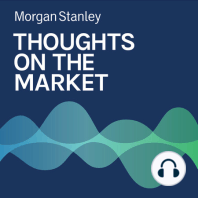4 min listen
Special Encore: Tax-Efficient Strategies
ratings:
Length:
9 minutes
Released:
Feb 10, 2022
Format:
Podcast episode
Description
Original Release on January 25th, 2022: With inflation on the minds of consumers and the Fed reacting with a sharp turn towards tightening, 2022 may be a year for investors to focus on incorporating tax-efficient strategies into their portfolios. Morgan Stanley Wealth Management’s Chief Investment Officer Lisa Shalett and Chief Cross-Asset Strategist Andrew Sheets discuss.----- Transcript -----Andrew Sheets Welcome to Thoughts on the Market. I'm Andrew Sheets, chief cross asset strategist for Morgan Stanley Research.Lisa Shalett And I'm Lisa Shalett, chief investment officer for Morgan Stanley Wealth Management.Andrew Sheets And today on the podcast, we'll be discussing the importance of tax efficiency as a pillar of portfolio construction. It's Tuesday, January 25th at three p.m. in London.Lisa Shalett And it's 10:00 a.m. here in New York.Andrew Sheets Lisa, welcome back to the podcast! Now, as members of Morgan Stanley Wealth Management's Global Investment Committee, we both agree that the current portfolio construction backdrop is increasingly complicated and constrained. But tax considerations are also important, and this is something you and your team have written a lot on recently. So I'd really like to talk to you about both of these issues, both the challenges of portfolio construction and some of the unique considerations around tax that can really make a difference to the bottom line of investment returns. So Lisa, let's start with that current environment. Can you highlight why we believe that standard stock bond portfolios face a number of challenges going forward?Lisa Shalett We've been through an extraordinary period over the last 13 years where both stocks and bonds have benefited profoundly from Federal Reserve policy, just to put it bluntly, and, you know, the direction of overall interest rates. And so, our observation has been that, you know, over the last 13 years, U.S. stocks have compounded at close to 15% per year, U.S. bonds have compounded at 9% per year. Both of those are well above long run averages. And so we're now at a point where both stocks and bonds are quite expensive. They are both correlated to each other, and they are both correlated to a large extent with Federal Reserve policy. And as we know, Federal Reserve policy by dint of what appears to be inflation that is not as transitory as the Fed originally thought is causing the Fed to have to accelerate their shift in policy. And I think, as we noted over the last three to six weeks, you know, the Fed's position has gone from, you know, we're going to taper and have three hikes to we're going to taper be done by March. We may have as many as four or five hikes and we're going to consider a balance sheet runoff. That's an awful lot for both stocks and bonds to digest at the same time, especially when they're correlated with one another.Andrew Sheets And Lisa, you know, if I can just dive into this a little bit more, how do you think about portfolio diversification in that environment you just described, where both stocks and bonds seem increasingly linked to a single common factor, this this direction of Federal Reserve policy?Lisa Shalett One of the things that we've been emphasizing is to take a step back and to recognize that diversification can happen beyond the simple passive betas of stocks and bonds, which we would, you know, typically represent by, you know, exposures to things like the S&P 500 or a Barclays aggregate. And so what we're saying is, within stocks, you've got to really make an effort to move away from the indexes to higher active managers who tend to take a diversified approach by sector, by style, by market cap. And within fixed income, you know, we're encouraging, clients to hire what we've described as non-core managers. These are managers who may have the ability to navigate the yield curve and navigate the credit environment by using, perhaps what are nontraditional type products. They may employ strategies that inc
Released:
Feb 10, 2022
Format:
Podcast episode
Titles in the series (100)
Mike Wilson: Weighing a Potential Fed Rate Cut by Thoughts on the Market
